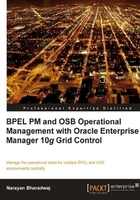
Business Process Execution Language (BPEL), short for Web Services Business Process Execution Language (WS-BPEL) is an executable language for specifying interactions with Web Services. Processes in Business Process Execution Language export and import information by using Web Service interfaces exclusively. Source: http://en.wikipedia.org/wiki/Business_Process_Execution_Language
Major vendors such as Oracle, Microsoft, and IBM are onboard with the BPEL standard, which has become the orchestration standard of choice. Oracle acquired a small company called Collaxa in 2005, which had an implementation of the BPEL standard, then renamed the product to BPEL Process Manager and made it the foundation of the SOA Suite. This also became the strategic technology product under the Fusion Middleware umbrella, as well as the Fusion Applications umbrella. Oracle Applications Unlimited (E-Business Suite, PeopleSoft, Siebel, Retek, and so on) use several different workflow technologies such as Oracle Workflow, but the roadmap for all these workflow technologies is to converge into the common BPEL standard, based on the Oracle BPEL Process Manager product. In short, this technology has huge implications not only for the overall middleware market, but also for the packaged applications market. Oracle, with its huge installed base in both the markets, especially after the acquisition of BEA in 2008, is focused on expanding the already large adoption of BPEL within its customer base.
BPEL Process Manager 10.1.2 was the first release after the Collaxa acquisition. Currently, the product is available as part of the Oracle SOA Suite 10.1.3.x. This is a fairly mature release of product, and has enjoyed widespread adoption among customers interested in implementing an SOA strategy. This is also the foundation of the next generation Oracle Fusion Applications.